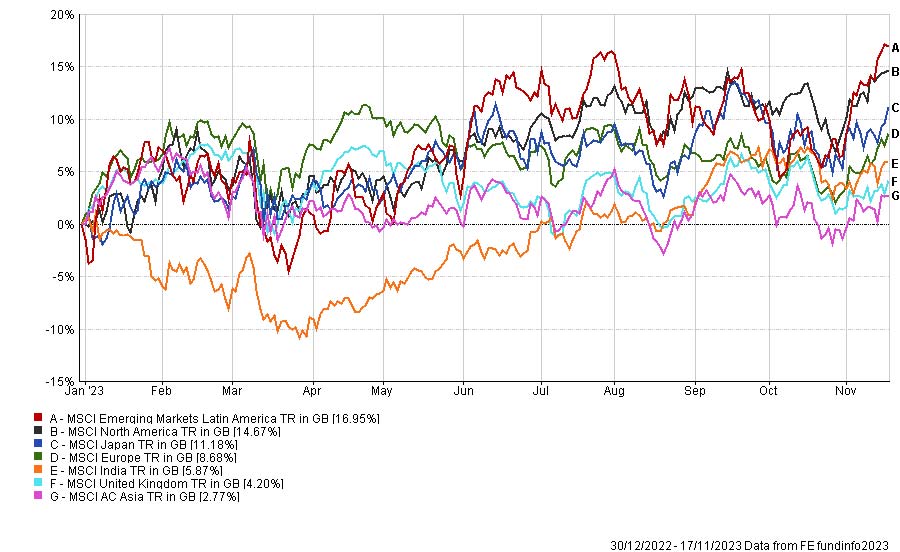This month:
Expert investment views:
Investors are reminded that economic, social and political upheaval also bring about big positives of resilience, innovation and change
Latin America is tipped to prosper from a new era of retooled globalisation focused on strengthening supply chains
Anti-obesity drugs are hailed as brightening pharmaceutical sector’s prospects, although selectiveness will be key
Featuring this month’s experts:



1. No shortage of positives for investors
Economic ‘normalisation’ has been harsh, particularly the speed of that adjustment. However, with signs that interest rates have peaked, and labour shortages and supply lines more stable, prospects for 2024 are improving. Artificial Intelligence may stimulate a multi-year growth opportunity – especially welcome in more developed economies where growth (except in the US), has been underwhelming, and the need to pay down national debt is pressing.
- 2024 should present better visibility, and broader opportunity. In addition to the dynamism of the US; Asia and emerging markets offer value as US interest rates fall and natural growth potential is recognised.
- Structural issues will keep commodity supply tight, so investors should maintain exposure. Japan’s extended period of accommodative monetary policy is unwinding, with the focus on investor returns. Many companies are trading below book value and the yen is historically undervalued, giving significant opportunity after 30 years of ‘false dawns’. The UK has world leading businesses at significant discounts to peers offering both capital and income growth potential in real terms, whilst valuations for mid-sized and smaller companies, both in the UK and globally, are especially compelling.
- Short-term cash deposits are at record levels, indicative of investor ‘weariness’. Economies have slowed, but confounded predictions of deep recession. Personal balance sheets remain under pressure, but wage growth has helped to mitigate this. Economic, social and political upheaval brings about resilience, innovation and change; there is no shortage of these positives right now, and there lies the opportunity for investors.
Artificial Intelligence may stimulate a multi-year growth opportunity – especially welcome in more developed economies where growth (except in the US), has been underwhelming, and the need to pay down national debt is pressing

Christopher Jeffreys
Investment Director at Tyndall Investment Management
2. Winners and losers on the world stage
If we look under the bonnet of the different equity markets, we see wide performance divergence between the regions and countries. The stand-out success story is once again Latin America, especially Brazil and Mexico. These countries are large commodity exporters and continue to benefit from global geopolitical tensions.
It is widely considered that globalisation peaked somewhere around the start of the pandemic, and until then, countries and businesses were running ‘just in time’ supply chains. The pandemic brought home to companies just how fragile this working method was. Reshoring, also sometimes called ‘friend-shoring’, is now a strategy many companies have adopted, meaning they are looking to partner with companies in countries they consider more reliable. For the US market, as an example, this would mean a preference for countries such as Mexico over China.
As we retreat from peak globalisation and enter a new era, there will be many more examples of governments and companies engaging with new partners to strengthen their supply chains
As we retreat from peak globalisation and enter a new era, there will be many more examples of governments and companies engaging with new partners to strengthen their supply chains. This will produce different winners and losers, but Latin America seems particularly well-placed to benefit, given the nature of the underlying economies.
At the other end of the scale is China, which, despite being the world’s second-largest economy is likely to continue losing out in some markets. Given the actions of the communist government in the last few years, it is considered unreliable and is often referred to by some American politicians as uninvestable. We would caution against writing China off, however, and the communist leadership know full well they have to manage a thriving economy if they are going to retain the support of the Chinese people.


Chris Metcalfe
Chief Investment Officer at IBOSS, part of the Kingswood Group

Top Tip
This month’s wealth managers have adopted a suitably panoramic view for our last Investment Bulletin of the year, taking in a broad sweep of global markets and sectors. As they emphasise, there is a lot of opportunity out there for 2024, but clearly investors are going to need to leverage a significant degree of intellectual capital to make the right choices when populating their portfolios.
If you’re keen to spread your wings as an investor and take a truly global view of your investments, you will need the reassurance of institutional-grade research (and, indeed, people who are experts in one particular sector in some instances). Why not take advantage of the no-obligation discussions leading wealth managers that we can arrange fast and free, so you can appraise the expertise available?

Lee Goggin
Co-Founder
3. The obesity drug boom brightens a dull pharmaceutical sector
The World Healthcare sector overall has been performing badly, leading some to ask if now is a good opportunity to buy. Meanwhile a couple of major companies have seen their shares soar this year as they develop anti-obesity drugs. Eli Lilly and Novo have caught the mood with their products, including Zepbound, Wegovy and Ozempic, helping more people, including some famous faces such as Elon Musk, Sharon Osbourne, and Boris Johnson, to slim down.
With almost 40% of people worldwide categorised as obese, the latest pharmaceutical innovation in weight-loss drugs looks set to continue to make headlines, especially the ‘celebrity’ pages. As well as providing a revolution in healthcare, the drugs could have significant implications across many other industries.
With almost 40% of people worldwide categorised as obese, the latest pharmaceutical innovation in weight-loss drugs looks set to continue to make headlines, especially the ‘celebrity’ pages. As well as providing a revolution in healthcare, the drugs could have significant implications across many other industries
So far, availability has been largely restricted to the US and European countries where the obesity problem is most acute. But Morgan Stanley believes the global obesity market could grow to $77bn by 2030, from just $2.4bn in 2022.
This is unlikely to remain a two-horse race. Competition is heating up as other players join the fast-growing market for obesity treatments – Pfizer, AstraZeneca and Roche are all making developments in the area.
Individual drug companies can do well as we have seen this year with the two that are advancing rapidly with obesity treatments. Other companies can lose out through a sharp decline in demand as with covid vaccines, or with loss of patent protection for important drugs. Buying and holding the sector as a whole has not worked well. More companies are now at share price levels where buyers will be attracted by any signs of recovery in sales and profits. But, for us, selectiveness will be key.

Patrick Farrell
Chief Investment Officer at Charles Stanley
Important information
The investment strategy and financial planning explanations of this piece are for informational purposes only, may represent only one view, and are not intended in any way as financial or investment advice. Any comment on specific securities should not be interpreted as investment research or advice, solicitation or recommendations to buy or sell a particular security.
We always advise consultation with a professional before making any investment and financial planning decisions.
Always remember that investing involves risk and the value of investments may fall as well as rise. Past performance should not be seen as a guarantee of future returns.



